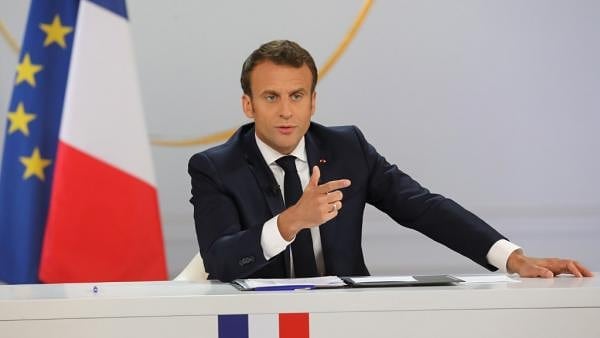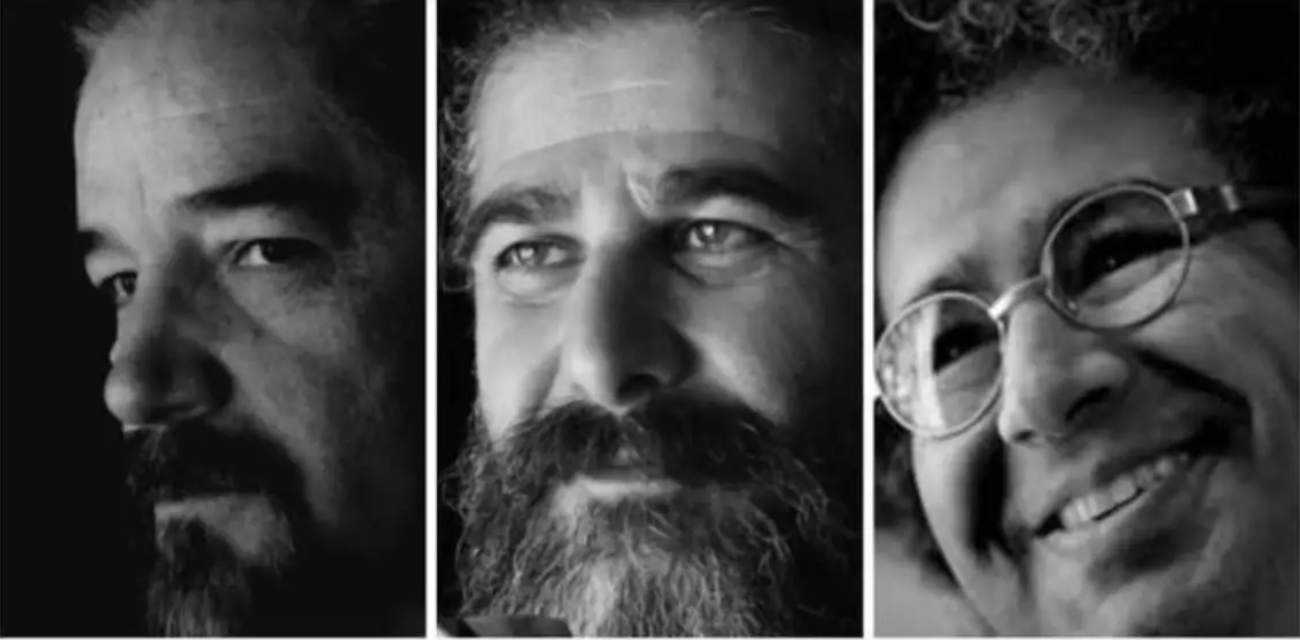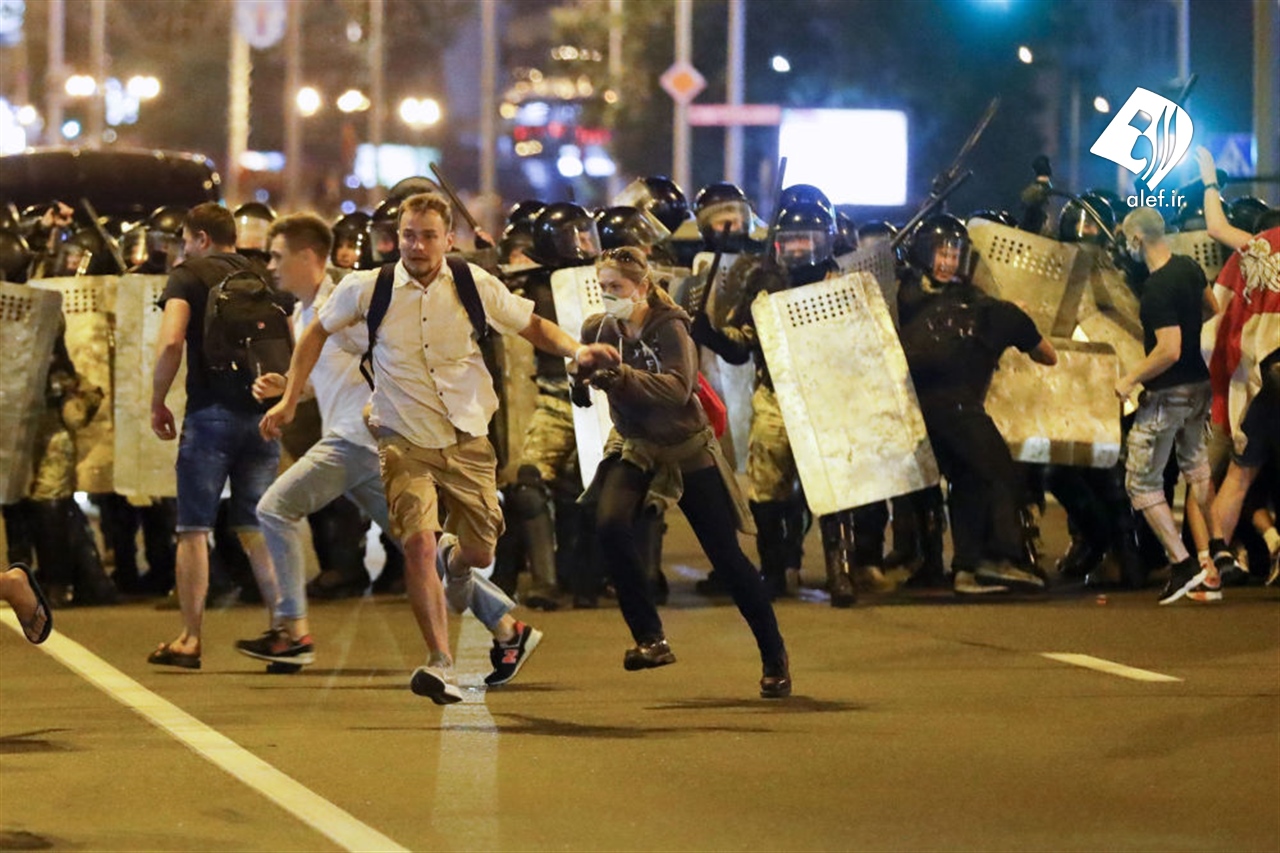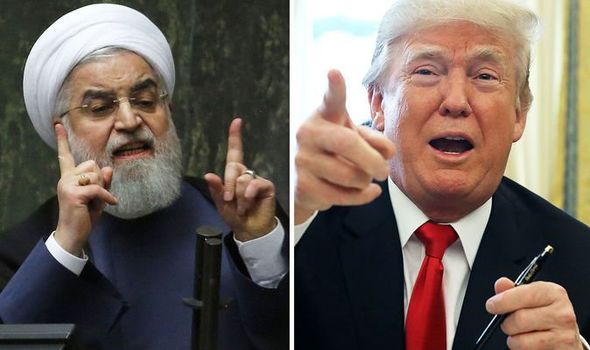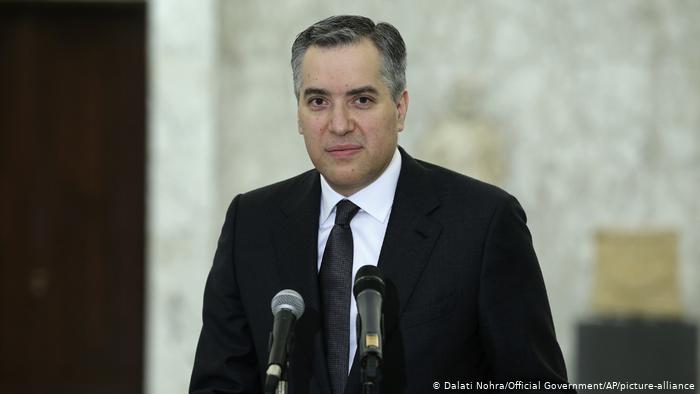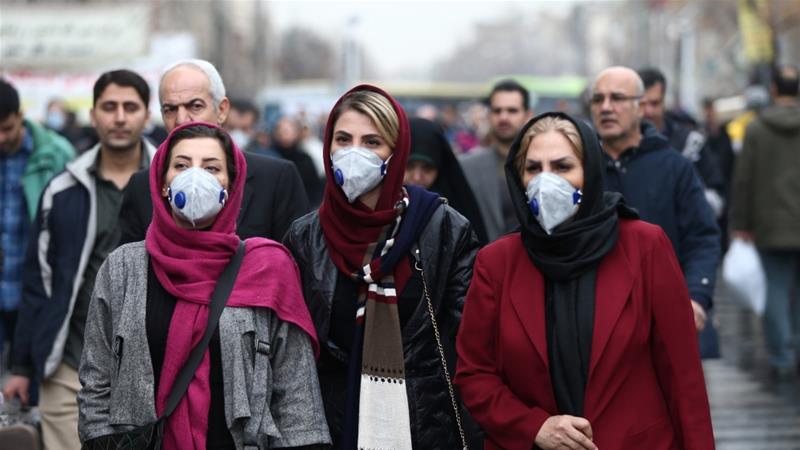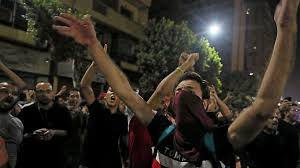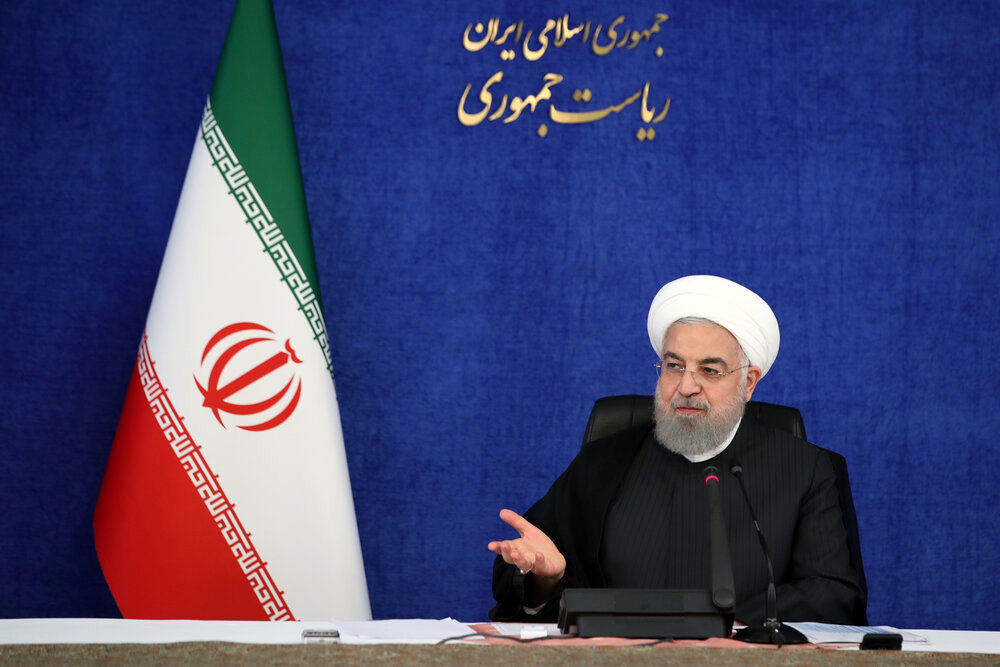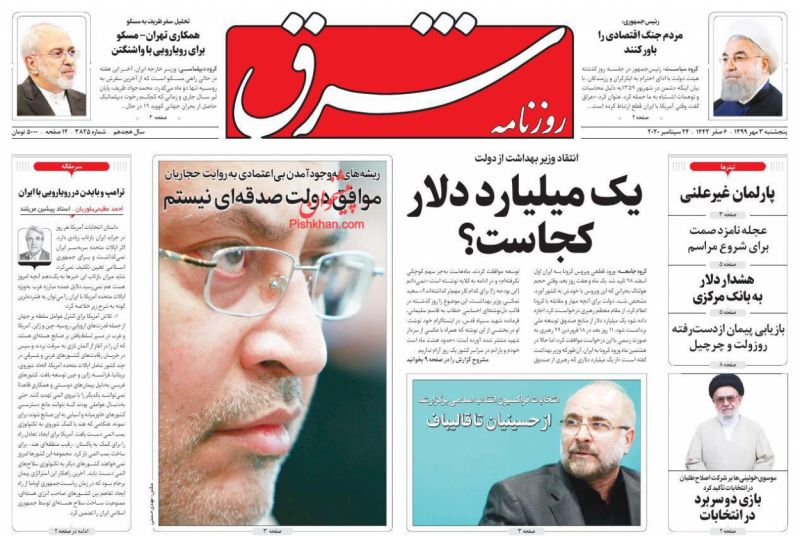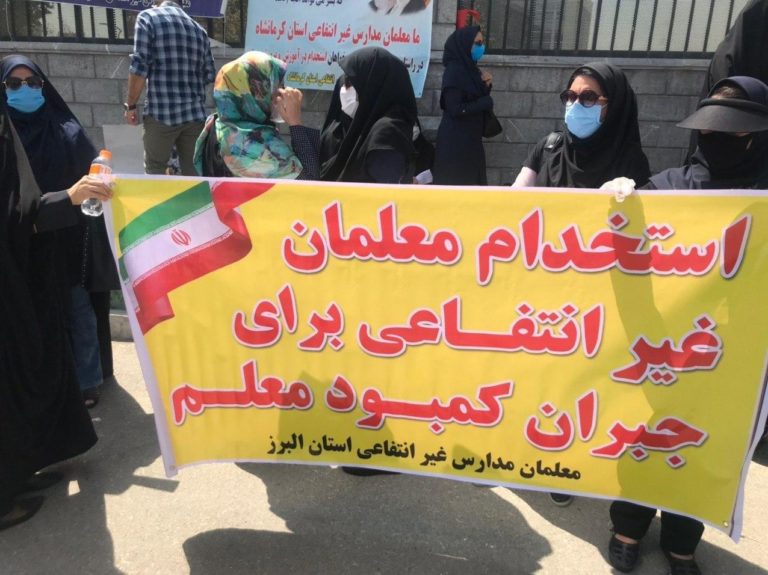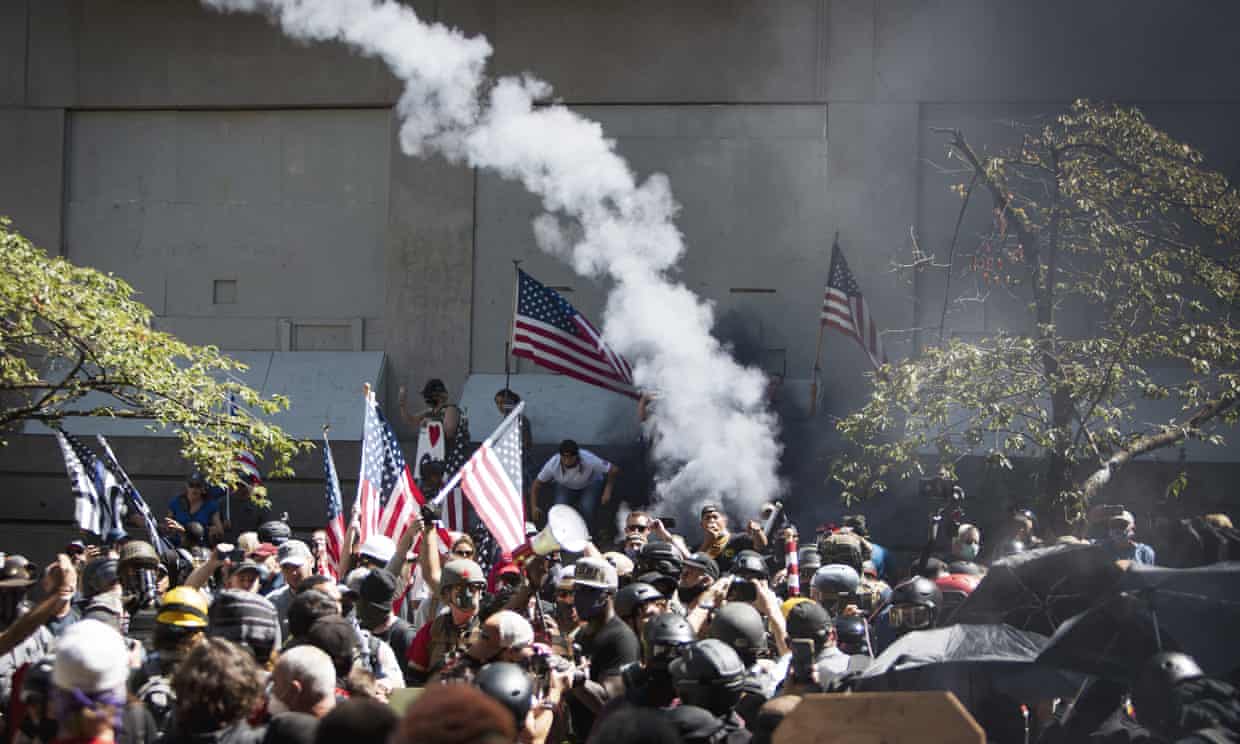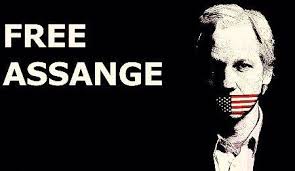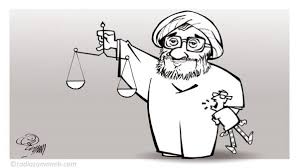پیتر استانو، سخنگوی مسئول سیاست خارجی اتحادیه اروپا روز دوشنبه ۲۸ سپتامبر (هفت مهر) گفت که تشدید نبردها در قرهباغ «بسیار نگرانکننده» و هرگونه مداخله «غیرقابل قبول» است.
وی در جلسه مطبوعاتی کمیسیون اروپا اعلام کرد که در این درگیری هیچ دخالتی قابل قبول نیست و تشدید درگیریها بسیار نگرانکننده است چراکه میتواند عواقب جدی برای ثبات منطقه داشته باشد.
ماکرون رفتار رهبران لبنان از جمله حزب الله را خیانت به مردم و شرم آور خواند
امانوئل ماکرون، رئیس جمهوری فرانسه، رهبران لبنان را به "خیانت" علیه مردم این کشور متهم کرد پس از آنکه حزب الله لبنان، متحد تهران، با همراهی سازمان شیعه امل به دلیل اصرار خود بر کسب انحصاری وزارت امور مالی بار دیگر تشکیل حکومت اضطراری در لبنان را با شکست روبرو ساخت.
رئیس جمهوری فرانسه در کنفرانس مطبوعاتی که دیشب یکشنبه بیست و شش سپتامبر در کاخ الیزه برگزار کرد با لحنی تُند رفتار رهبران لبنان را که طی دهه های گذشته تغییر نیافته اند "شرم آور" خواند. شنبۀ گذشته مصطفی ادیب نخست وزیر لبنان با اعلام ناتوانی خود از تشکیل دولت جدید در نتیجۀ مطالبات حزب الله و سازمان امل از مقام خود کناره گیری کرد.
اعتراض کانون نویسندگان ایران به اجرای حکم زندان رضا خندان (مهابادی)، بکتاش آبتین و کیوان باژن
دو روز پس از اجرای حکم زندان دو تن از اعضای هیئت دبیران، رضا خندان (مهابادی) و بکتاش آبتین، و عضو پیشین هیئت دبیران کانون نویسندگان ایران، کیوان باژن؛ کانون نویسندگان با صدور بیانیهای ضمن اشاره به «افزایش فشار بر نویسندگان مستقل» و روی آوردن حکومت به «سرکوب هرچه بیشتر آزادی بیان و بازداشت و شکنجه و اعدام معترضان» اعلام کرد که اجرای این احکام را «اقدامی جنایتکارانه و خلاف موازین حقوق بشر میداند و آن را محکوم میکند.» کانون نویسندگان ایران همچنین خواستار آزادی بی قید و شرط این سه عضو خود شد.
کرونا در ایران: وضعیت تهران بحرانی است؛ احتمال مرگ روزانه ٦۰۰ نفر به دلیل ابتلا به کرونا در ماه آبان
سخنگوی وزارت بهداشت ایران، روز دوشنبه ۷ مهر، از شناسایی ۳۵۱۲ بیمار جدید مبتلا به کرونا و مرگ ۱٩۰ نفر دیگر در شبانه روز گذشته خبر داد و هشدار داد که «اگر روال تابستان را پیش بگیریم، شمار قربانیان کرونا بیشتر می شود». رئیس دانشگاه علوم پزشکی تهران نیز با اشاره به شرایط سخت بیمارستان های کشور در شرایط کرونا، تأکید کرد که «کار از موج اول، دوم و سوم گذشته است و با اپیدمی ممتدی روبرو هستیم».
مکرون: لوکاشنکو باید از ریاست جمهوری بلاروس کنار برود
پس از آن که اتحادیه اروپا الکساندر لوکاشنکو را به عنوان رئیس جمهور مشروع بلاروس به رسمیت نشناخت، امانوئل مکرون، رئیس جمهور فرانسه، هم اعلام کرد که او باید از قدرت کنار برود.
نیویورك تایمز: با وجود کرونا چین چگونه پروژه احیای اقتصاد را کلید زد؟
روزنامه آمریکایی «نیویورک تایمز» در گزارشی به نقش احیای نظام اقتصادی چین در تامین منافع اقتصادی کشورهای جهان پرداخت و نوشت برغم تاثیر کرونا در توقف فعالیت های صنعتی چین در اوایل سال جاری میلادی، دولت پکن در حال حاضر در مسیر احیای موتورهای بخش صنعتی خود قرار گرفته و قیمت جهانی فلزات نشان دهنده تمایل احیا شده چین برای رشد اقتصادی است.
هشدار درباره جنگ داخلی در آمریکا پس از انتخابات
نشریات عرب: مذاکرات محرمانه میان تهران و واشنگتن در عمان برای رسیدن به یک توافق هستهای جدید
در حالی که دونالد ترامپ، رئیس جمهوری ایالت متحده آمریکا، شامگاه جمعه بیست و پنجم سپتامبر طی یک سخنرانی انتخاباتی در فلوریدا، اعلام کرد که شرایط گفتگو و مذاکره با جمهوری اسلامی ایران پس از انتخابات ریاست جمهوری ماه نوامبر سخت تر خواهد شد، هفته نامه «کوریه انترناسیونال» به نقل از روزنامه «الجریده» از احتمال مذاکرات محرمانه میان این دو کشور در عمان خبر داده است.
شیوع کرونا در ایران و جهان؛ تهران در وضعیت کاملاً بحرانی است
شمار مبتلایان به ویروس کرونا در سراسر جهان تا نیمروز شنبه ۲۶ سپتامبر (۵ مهر) به بیش از ۳۲ میلیون و ۸۰۷ هزار نفر و شمار قربانیان آن به بیش از ۹۹۴ هزار و ۳۰۰ نفر رسید.
ماموریت مصطفی ادیب برای تشکیل دولت در لبنان شکست خورد
نخستوزیر لبنان در ملاقات با رئیس جمهور این کشور از پذیرش ماموریت تشکیل کابینه عذرخواست. او قصد داشت به جای وزرای پیشنهادی احزاب سیاسی، تکنوکراتها را وارد کابینه خود کند. اما احزاب سیاسی لبنان این شرط او را نپذیرفتند.
نقشه سپاه پاسداران برای آینده ایران: نه اصلاحطلب نه اصولگرا، فقط رئیس جمهور نظامی
محسن رفیقدوست، از فرماندهان پیشین سپاه پاسداران و وزیر پیشین سپاه در دولت جمهوری اسلامی، خواستار به قدرت رسیدن یک رئیس جمهور نظامی (سپاهی) در انتخابات آینده در ایران شد. او گفت: «سپاه نه اصولگراست نه اصلاح طلب اما یک فهم و بینش سیاسی دارد.»
وزیر بهداشت انگلیس: شیوع کرونا ممکن است باعث تعطیلی کامل شهرها شود
«در آن صورت آشکارا خسارات اقتصادی و اجتماعی زیادی به ما تحمیل خواهد شد»
تسلیم کرونا و دولت نشویم!
نویسنده: مظفر محمدی
هر چند ماه یک بار موج جدید اپیدمی کرونا جان خیل عظیمی از انسان ها را می گیرد. در کنار خونسردی حکام، هشدارهای الکی، عمق مصیبت چنان است که ترس و بهت جواب آن را نمی دهد. تنها تسلیم است که این فاجعه را برای مردم قابل پذیرش کرده است. حکام جوامع بشری به مردم می گویند، "با کرونا زندگی کنید". چرا که مهم این است چرخه اقتصاد و سودآوری سرمایه متوقف نشود.
نیکلاس مادورو خواستار آزادی جولیان آسانژ شد
۱۶۰ تن از دیپلماتها، فعالان سیاسی و رهبران جهانی گفتهاند جولیان آسانژ، بنیانگذار ویکیلیکس، باید از زندان بریتانیا آزاد و نباید به آمریکا تحویل داده شود.
این گروه پر قدرت در نامهای سرگشاده خطاب به نخست وزیر، بوریس جانسون، و سایر وزرا حمایت خود را از آسانژ اعلام کردند.
از جمله امضاءکنندگان نامه، رئیس جمهور آرژانتین، آلبرتور فرناندز، و دو رئیس جمهور سابق برزیل، دیلما روسف و لوئیز ایناسیون لولا دا سیلوا، بودهاند.
این نامه همچنین به امضاء یک سری منتقد آمریکایی، از جمله رئیس جمهور ونزوئلا، نیکولاس مادورو، و رهبر سابق اکوادور، رافائل کوریا، نیز رسیده است.
آقای آسانژ ۴۹ ساله برای جلوگیری از استردادش به آمریکا در دادگاه انگلیسی از خود دفاع میکند. وی در آمریکا به خاطر انتشار اسناد محرمانه در ویکیلیکس در سالهای ۲۰۱۰ و ۲۰۱۱ با اتهام جاسوسی رو به رو است.
او در صورت محکومیت ممکن است تا ۱۷۵ سال حکم زندان دریافت کند. نامه اخیر اولین بار توسط تیم وکلای آسانژ در ماه آگوست تهیه شد ولی اسامی امضاءکنندگان سیاسی روز دوشنبه منتشر شد.
در این نامه، علت این که چرا آسانژ نباید به آمریکا تحویل داده شود با ادله حقوقی مطرح شده است، که از جمله آنها این است که ممکن است وی به طور عادلانه مورد قضاوت قرار نگیرد و «مورد شکنجه یا سایر رفتارهای غیرانسانی، بیرحمانه یا ظالمانه قرار گیرد».
جنیفر رابینسون، وکیل آسانژ، به انبیسی نیوز گفت: «این نامه مخالفت فزاینده جهان با تلاش آمریکا برای بازگرفتن و پیگرد آسانژ را نشان میدهد، و این که موضوع تا چه اندازه سیاسی است.»
آسانژ در آوریل ۲۰۱۹ در سفارت اکوادور دستگیر شد که مدت هفت سال در آنجا پناه گرفته بود. او به دلیل نقض قانون آزادی مشروع بلافاصله بازداشت و به ۵۰ هفته حبس محکوم شد و تا پایان جلسات دادگاهش در زندان بلامارش نگه داشته خواهد شد.
استعفای امل کلونی در اعتراض به تصمیم دولت بریتانیا
«تصمیم دولت بریتانیا عواقب وحشتناکی برای دنیا دارد»
سومین روز متوالی اعتراضات علیه حکومت سیسی در سراسر مصر
شكایت خوردوسازی های بزرگ جهان (تسلا، ولو، فورد و مرسدس) از ترامپ
چهار شرکت بزرگ خودروسازی از دونالد ترامپ و آمریکا به دلیل اعمال تعرفههای غیرقانونی بر قطعات یدکی ساخت چین شکایت کردند.
روحانی: مردم جنگ اقتصادی را باور کنند
روحانی در جلسه روز گذشته هیئت دولت با ادای احترام به ایثارگران و رزمندگان، با بیان اینکه دشمن در شهریور 1359به دلیل محاسبات و توهمات اشتباه به ما حمله کرد، عنوان کرد: «عراق گفت وقتی آمریکا با ایران قطع ارتباط کرده است، نیروی هوایی ایران کارایی ندارد و ارتش هم آمادگی ندارد. سپاه هم به شکل نیروی انتظامی بود. عراق معتقد بود که کشورهای منطقه به آنها قول حمایت دادند، در داخل کشور هم اختلافهایی بود و ایران حامی خارجی ندارد، پس با حمله برقآسا انقلاب را سرنگون میکنیم. هدف صدام، سرنگونی انقلاب و نظام بود و گفت اگر به هدفم نرسیدم، بخشی از ایران را تصرف میکنم یا معاهده ایران و عراق را پاره میکنم و حاکمیت خود بر اروندرود را اعمال میکنم؛ ولی رسوا و سرنگون شدند. همه کشورهای منطقه که از آنها حمایت کردند، ابراز پشیمانی کردند. گفتند چه پولهایی به صدام دادهاند».
حسن روحانی ادامه داد: امروز همین اتفاق تکرار شده است. تحریمهای آمریکا هم بر اساس محاسبات اشتباه بود. ملت دقت کنند ما تحریم اقتصادی از سال ۵۹ داشتهایم، اما جنگ اقتصادی از ۹۷ شروع شد. آمریکا با تمام امکانات وارد جنگ با ایران شده است. صدام گفت ادامه مصاحبه را در اهواز انجام میدهم، آمریکا هم گفت چند ماه دیگر وارد تهران میشویم و انقلاب 40سالگی خود را نمیبیند. فکر میکرد در فرودگاه مهرآباد یا امام برای آنها فرش قرمز پهن شده است. به کشورهای اروپایی گفته بودند سه ماه دیگر جمهوری اسلامی وجود ندارد. خواستند نظام را سرنگون کنند و توافق را از بین ببرند، ولی به اهدافشان نرسیدند».
او افزود: «همان قطعنامه ۲۲۳۱ در برابر آنها ایستاد و آنها را مفتضح کرد. آمریکا چند نوبت به شورای امنیت رجوع کرد، زیرا آنجا را حیاطخلوت خود میدانست، ولی قطعنامه آنها علیه ایران برای نقض قطعنامه ۲۲۳۱ و تمدید تحریم تسلیحاتی موفق نشد و فقط دومینیکن با آنها همراه شد و سایر کشورها مقابل آنها ایستادند؛ ابهت آمریکا فرو ریخت. نیجریه، اندونزی، تونس، روسیه، چین و اروپا مقابل آنها ایستادند». رئیسجمهور گفت: «ملت با باور و ایستادگی خود این موفقیت بزرگ سیاسی، حقوقی و دیپلماسی را در سازمان ملل به دست آورد. مردم مظلومیت کشور در جنگ تحمیلی را احساس کرده و باور کردند که بار جنگ بر دوش همه است، نهفقط بر دوش نیروهای مسلح و همه به میدان آمدند. من دو فرزند رهبری و مرحوم هاشمی و مقامات قضائی را در جبهه دیدم و با خود گفتم ما در جنگی که فرزندان رؤسای قوا و همه مردم در آن حضور دارند، شکست نمیخوریم. هر روز امکانات جنگی به دشمن داده میشد، اما توپ ضدهوایی ما را که تولید دو کشور اروپایی بود هم تعمیر نمیکردند و حتی آن را به ما پس هم ندادند. این اروپا و غرب در برابر ملت ما چه کرد. ملت روی پای خود ایستاده و فداکاری کرد و با همه سختیهایی که تحمل کرد، پیروز شد».
او با بیان اینکه امروز هم در یک جنگ اقتصادی هستیم، افزود: «مردم این جنگ را باور کنند و بدانند مسئولان اقتصادی کشور در دو سال و نیم گذشته در حال فداکاری هستند؛ البته در جنگ هم شکست و هم پیروزی وجود دارد. پیامبر و امیر المؤمنان هم در جنگ احد و خندق مجروح شدند و حمزه سیدالشهدا به شهادت رسید. ما ابتدا باید باور کنیم در یک جنگ هستیم و همچنین باور کنیم که بار جنگ تنها بر دوش دولت نیست؛ نباید عدهای کنار بنشینند و بگویند اگر دولت آنگونه رفتار میکرد بهتر بود. ما وارد جنگ بزرگی شدهایم و پیروز میشویم؛ البته مردم باور کردند در جنگ هستیم و مسئولان هم باید کنار هم باشند. امروز قوای سهگانه نیروهای مسلح و همه ارکان کشور یک صدا بوده و در کنار هم هستند. همانطور که در برابر کرونا هم توانستیم بایستیم در این جنگ اقتصادی هم موفق میشویم».
----
منبع: روزنامه شرق
حجاریان: مردم زير «اين همه فشار» چرا بايد اعتماد كنند؟
سعید حجاریان درباره علت و میزان بیاعتمادی مردم به دولت به زمینهها و روندی که طی کرده است، گفت: «بیاعتمادی مردم به قدرت یا به بیان دیگر، نهاد دولت سابقهای طولانی دارد. مقدمه آن در دوره پهلوی رخ داد. زمانی که مردم دیدند دولتمردان پهلوی آنگونه که بایسته است، رفتار نمیکنند و نهایتا هم کار به انقلاب و فرار رسید؛ یعنی اساسا بحث اعتمادسازی از دستور کار خارج بود. اما بحث ما درباره بعد از انقلاب است و من بر این دوره تمرکز میکنم. ببینید! اولین نشانههای بیاعتمادی در دولت مهندس بازرگان رخ داد. مرحوم بازرگان بههرحال شخصیتی مرضیالطرفین محسوب میشد و به گمان بسیاری از جمله شخص امام صلاحیت نخستوزیری داشت، منتهی اختیار مملکتداری به او سپرده نشد. خود ایشان میگوید چاقوی بیدسته به من دادهاند؛ یعنی همین بحثی که تا امروز گشوده است؛ شکاف اختیار و مسئولیت و میبینیم دولت موقت هر کاری میکند، یک نفر یا یک گروه یکجای مملکت خرابکاری میکند. یکی تصفیه میکند، یکی خودسری میکند. این اولین جرقه بیاعتمادی بعد از انقلاب بود و مردم و بعضی گروهها فهمیدند احتمالا در روی همان پاشنه خواهد چرخید. نمونه دیگر جالب توجه است که این هم بیاعتمادی به بار آورد».
به گزارش «انصافنیوز» او ادامه داد: «از این گذشته، من به دفعات گفتهام دروغ یکی از عوامل اصلی این وضعیت نابهنجار ماست که بیاعتمادی یکی از نتایج آن است. واقعیت این است هم احمدینژاد دروغ گفت و هم روحانی. بهعلاوه ما در جمهوری اسلامی با مسئلهای مواجه هستیم، بهنام آزردگی نهادینه. یعنی کسی نیست از برخورد نهادهای دولتی مصون باشد و آزار نبیند و از همه مهمتر؛ ببینید ما یک دهه پیش با پدیدهای روبهرو بودیم که در دوربین زل میزد و دروغ میگفت. حالا ما با پدیدههایی مواجه هستیم که به بیتالمال دستاندازی میکنند...».
حجاریان میگوید در مقاطعی پس از انقلاب در زمینه کمکردن دامنه بیاعتمادیها تلاشهایی شده است: «در مقاطعی در زمینه اعتمادسازی کوششهایی صورت گرفته است. مثلا مهندس موسوی زمانی که شایعه کمبود گندم مطرح شد، دستور داد نانواها آردشان را بیرون از نانوایی بگذارند تا مردم فکر کنند از کمبود جا این اتفاق افتاده است. یا مثلا در زمینه بحث تخصیص کوپن، بهرغم انتقاداتی که به این مکانیسم اقتصادی وارد است، مردم احساس میکردند دولت نظری به آنها دارد، ولو به شکل حداقلی و با سیاست بازتوزیع». او در پاسخ به اینکه در زمان آقای خاتمی این تلاشها به چه صورت بوده است، گفت: «آقای خاتمی از این سنخ کارهای نمادین نکرد، چون کشور شرایط جنگی نداشت اما در عمل از حقوق مردم حراست کرد، فساد را کاهش داد و به لحاظ امنیتی کشور را حفظ کرد و مهمتر از همه ترمز قتلهای زنجیرهای را کشید. من نمیخواهم دوره اصلاحات را سراسر سفید نشان دهم اما استنباطم این است هنرمندان و قشرهایی که در فراموشی و زیر فشار بودند، قدری توانستند به فعالیتهای خود سامان بدهند؛ البته خطونشانها همچنان باقی بود!» سعید حجاریان درباره اینکه آیا هنوز راهی برای اعتمادسازی وجود دارد، گفت: «من معتقدم راه اعتمادسازی، در کشوری با شرایط ما، همان مقوله مراقبت یا care کردن است. من موافق دولت صدقهای نیستم و اساسا دولت خیر (charity state) را نادرست میدانم، منتها در ایران بعضی آن را با دولت رفاه یکی میدانند. با همین ملاحظه معتقدم دولت باید مسئله اشتغال را از وضعیت بحران خارج کند. توجه کنید از حل مسئله و برطرفکردن کامل بیکاری نمیگویم؛ چون در کوتاهمدت اتفاق نمیافتد. ببینید اگر بیکار وجود نداشته باشد یا بیکارِ ناامید نباشد، ناهنجاری کم میشود و دیگر نمیبینیم کسی به جرم دزدیدن نان محکوم به اعدام شود یا بهخاطر دزدیدن پوشک برای بچهاش یا حتی چند عدد نارنج دادگاهی شود. در اینجا باید به تفکیک میان دولت خیّر و دولت مراقب اشاره کنم. گاهی اوقات مثلا در زمانی که کشور در وضعیت اورژانسی است، نیاز به دولت خیّر داریم تا سیلزدهها و زلزلهزدهها را مدیریت کند، اقلام حمایتی توزیع کند و حتی تا مدتی پول بپردازد. الان، زمان کروناست و ممکن است چنین شود؛ چنانکه مثلا یونان یا آمریکا، بهعنوان دو کشور که یکی وضعیت مطلوب اقتصادی ندارد و دیگری در وضعیت مطلوبی به سر میبرد، هر دو در بحران کرونا به شهروندان پرداخت نقدی دارند. اما دولت خیّر، موقت است و کارویژه آن باید بعد از مدتی متوقف و کمکها قطع شود تا دوباره کسبوکار راه بیفتد و اعتمادبهنفس مردم آسیبدیده بهجای خودش برگردد. فراموش نکنید، برای یک سرپرست خانوار که شغل و درآمد خوبی داشته و بهعلت سیل، زلزله یا موارد دیگر شغل و خانه و سرمایهاش را از دست داده، ساده نیست با حمایت زندگی کند و خواسته اصلی او احیای وضعیت پیشین است، اما دولت مراقب مربوط به دوره ثبات است و استمرار دارد و مراقب است بلایی به سر مردم نیاید».
---
منبع: روزنامه شرق
بازگشایی مدارس و بیگاری معلمان موقت در مدارس دولتی و «غیرانتفاعی»
حدود ۲۶۰ هزار معلم مدارس دولتی و مدارس خصوصی موسوم به «غیرانتفاعی» با قراردادهای موقت، حقوقهای کمتر از حداقل دستمزد و گاه حدود ۵۰۰ هزار تومان در ماه، نبود امنیت شغلی و در مواردی نداشتن بیمه نیز دست و پنجه نرم میکنند. این بخشی از مشکلات آموزگاران است.
گاردین: طرح و نقشه حامیان ترامپ در پورتلند برای ایجاد ارعاب
گاردین در گزارشی از افشا شدن مکالماتی نوشت که نشان میداد حامیان دونالد ترامپ در منطقه پورتلند قصد داشتند به اقدامات ارعاب از جمله ترور دست بزنند.
دوران افول ماتئو سالوینی در ایتالیا آغاز شده؟
یک روزنامهٔ ایتالیایی مینویسد مردم از عوامگرایی (پوپولیسم) سالوینی خسته شدهاند
اهالی شش ناحیهٔ ایتالیا، ۲۰ و ۲۱ سپتامبر به پای صندوقهای رأی رفتند تا در "اولین انتخابات پس از دوران کووید" شرکت کنند.
دونالد ترامپ به انتقال مسالمتآمیز قدرت تعهد نداد
دونالد ترامپ از تائید واگذاری مسالمتآمیز قدرت در صورت شکست در انتخابات ریاست جمهوری آمریکا خودداری کرد. او بار دیگر ادعا کرد با رای دادن از طریق پست به خاطر شیوع کرونا امکان تقلب انتخاباتی افزایش مییابد.
بیش از ۱۵۰ وكیل عالیرتبه در جهان طی نامه ای به دولت بریتانیا خواستار آزادی بی قید و شرط جولیان آسانژ شدند!
Open Letter to the UK Prime Minister, Mr Boris Johnson, the Lord Chancellor and Secretary of State for Justice, Robert Buckland QC, the Secretary of State for Foreign Affairs, Dominic Raab and UK Home Secretary Priti Patel
-------
Dear Prime Minister,
Dear Lord Chancellor and Secretary of State for Justice,
Dear Secretary of State for Foreign Affairs,
Dear Home Secretary,
We write to you as legal practitioners and legal academics to express our collective concerns about the violations of Mr. Julian Assange’s fundamental human, civil and political rights and the precedent his persecution is setting.
We call on you to act in accordance with national and international law, human rights and the rule of law by bringing an end to the ongoing extradition proceedings and granting Mr. Assange his long overdue freedom – freedom from torture, arbitrary detention and deprivation of liberty, and political persecution.
- ILLEGALITY OF POTENTIAL EXTRADITION TO THE UNITED STATES
Extradition of Mr. Assange from the UK to the US would be illegal on the following grounds:
- Risk of being subjected to an unfair trial in the US
Extradition would be unlawful owing to failure to ensure the protection of Mr. Assange’s fundamental trial rights in the US. Mr. Assange faces show trial at the infamous “Espionage court” of the Eastern District of Virginia, before which no national security defendant has ever succeeded. Here, he faces secret proceedings before a jury picked from a population in which most of the individuals eligible for jury selection work for, or are connected to, the CIA, NSA, DOD or DOS.[i]
Furthermore, Mr. Assange’slegal privilege, a right enshrined in Art. 8 European Convention on Human Rights (ECHR) and long recognised under English common law, was grossly violated throughconstant and criminal video and audio surveillance at the Ecuadorian embassy carried out by the Spanish security firm, UC Global. This surveillance was, according to witness testimony, ordered by the CIA and has triggered an investigation into the owner of UC Global, David Morales, by Spain’s High Court, the Audiencia Nacional.[ii] The surveillance resulted in all of Mr. Assange’s meetings and conversations being recorded, including those with his lawyers. The Council of Bar and Law Societies of Europe, which represents more than a million European lawyers, has expressed its concerns that these illegal recordings may be used – openly or secretly – in proceedings against Mr. Assange in the event of successful extradition to the US. The Council states that if the information merely became known to the prosecutors, this would present an irremediable breach of Mr. Assange’s fundamental rights to a fair trial under Art. 6 of the ECHR and due process under the US Constitution.[iii] Furthermore, the prosecuting state obtained the totality of Mr. Assange’s legal papers after their unlawful seizure in the Embassy. Upon hearing that the Government of Ecuador was planning to seize and hand over personal belongings of Mr. Assange, including documents, telephones, electronic devices, memory drives, etc. to the US, the UN Special Rapporteur on Privacy, Joseph Cannataci, expressed his serious concern to the Ecuadorian government and twice formally requested it to return Mr. Assange's personal effects to his lawyers, to no avail.[iv] The UN Model Treaty on Extradition prohibits extradition if the person has not received, or would not receive, the minimum guarantees in criminal proceedings, as enshrined in Art. 14 of the International Covenant on Civil and Political Rights (ICCPR).[v]
- The political nature of the offence prohibits extradition
The US superseding indictment issued against Mr. Assange on the 24 June 2020 charges him with 18 counts all related solely to the 2010 publications of US government documents. The publications, comprising information about the wars in Iraq and Afghanistan, US diplomatic cables and Guantanamo Bay, revealed evidence of war crimes, corruption and governmental malfeasance.[vi]
Charges 1-17 are brought under the Espionage Act 1917, which, in name alone, reveals the political and antiquated nature of the charges.[vii]Furthermore, the essence of the 18 charges concerns Mr. Assange’s alleged intention to obtain or disclose US state “secrets” in a manner that was damaging to the strategic and national security interests of the US state, to the capability of its armed forces, the work of the security and intelligence services of the US, and to the interests of the US abroad. Thus, the conduct, motivation and purpose attributed to Mr. Assange confirm the political character of the 17 charges brought under the Espionage Act (‘pure political’ offences) and of the hacking charge (a ‘relative political’ offence). In addition, several US government officials have at various times ascribed motives “hostile” to the US to Mr. Assange, an Australian citizen.[viii] The UK-US Extradition Treaty, which provides the very basis of the extradition request, specifically prohibits extradition for political offences in Art. 4(1). Yet the presiding judge and prosecution wish to simply disregard this article by referring to the Extradition Act 2003 (“EA”) instead, which does not include the political offence exception. This blatantly ignores the fact that the EA is merely an enabling act that creates the minimum statutory safeguards, but it does not preclude stronger protections from extradition as expressly provided in subsequently ratified treaties such as the UK-US Extradition Treaty. Furthermore, there is broad international consensus that political offences should not be the basis of extradition.[ix] This is reflected in Art. 3 of the 1957 European Convention on Extradition, Art. 3 ECHR, Art. 3(a) of the UN Model Treaty on Extradition, the Interpol Constitution and every bilateral treaty ratified by the US for over a century.
- Risk of torture or other cruel, inhuman or degrading treatment or punishment in the US
The United Nations Special Rapporteur on Torture and Other Cruel, Inhuman or Degrading Treatment or Punishment (“the UN Rapporteur on Torture”), Professor Nils Melzer, has expressed with certainty that, if extradited to the US, Mr. Assange will be exposed to torture or other cruel, inhuman or degrading treatment or punishment. Similar concerns have also been raised by the UN Working Group on Arbitrary Detention, and Amnesty International has recently restated its concerns in relation to the unacceptable risk of mistreatment.[x]
The detention conditions, and the draconian punishment of 175 years, in a maximum security prison, which Mr. Assange faces under the US indictment, would constitute torture or other cruel, inhuman or degrading treatment or punishment, according to the current UN Rapporteur on Torture and according to theconsistently expressed opinion of his predecessor, as well as of NGOs and legal authorities.[xi]
If extradited, Mr. Assange would, by the US government’s own admission, likely be placed under Special Administrative Measures. These measures prohibit prisoners from contact or communication with all but a few approved individuals, and any approved individuals would not be permitted to report information concerning the prisoner’s treatment to the public, thereby shielding potential torture from public scrutiny and government from accountability.[xii]
Under the principle of non-refoulement, it is not permissible to extradite a person to a country in which there are substantial grounds for believing that they would be subjected to torture. This principle is enshrined in the 1951 UN Convention Relating to the Status of Refugees, specifically Art. 33(1) from which no derogations are permitted. Also relevant are Art. 3(1) UN Declaration on Territorial Asylum 1967, Art. 3 of the Convention against Torture and Other Cruel, Inhuman or Degrading Treatment or Punishment (CAT), and Art. 2 of the Resolution on Asylum to Persons in Danger of Persecution, adopted by the Committee of Ministers of the Council of Europe in 1967. As an obligation arising from the prohibition of torture, the principle of non-refoulement in this area is absolute and also takes on the character of a peremptory norm of customary international law, i.e. jus cogens.[xiii]
Mr. Assange, who was accepted as a political asylee by the Ecuadorian government owing to what have proved to have been wholly legitimate fears of political persecution and torture in the US, should clearly have been accorded protection of this principle, firstly by Ecuador and secondly by the UK. Ecuador violated its human rights obligations by summarily rescinding Mr. Assange’s asylum in direct contradiction of the ‘Latin American tradition of asylum’[xiv] and the Advisory Opinion OC-25/18 of 30 May 2018 of the Inter-American Court of Human Rights affirming the principle of non-refoulement in cases of persons who have entered an embassy for protection.[xv] The entry of the Ecuadorian Embassy by UK police and the arrest of Mr. Assange were thus based on an illegal revocation of his nationality and asylum, which can only be rectified by the UK upholding its own duty to protect the principle of non-refoulement by denying extradition to the US.
B) VIOLATIONS OF THE FREEDOM OF THE PRESS AND THE RIGHT TO KNOW
Counts 1-17 of the indictment under the Espionage Act violate the right to freedom of expression, the right to freedom of the press and the right to know. These counts present standard and necessary investigative journalistic practices as criminal.[xvi] Such practices include indicating availability to receive information, indicating what information is of interest, encouraging the provision of information, receipt of information for the purpose of publication, and publication of information in the public interest.
Under the charge of conspiracy to commit computer intrusion, the initial indictment criminalised also Mr. Assange’s alleged attempt at helping his source to maintain their anonymity while providing the documents in question, which falls squarely under the standard journalistic practice and duty of protecting the source. In a bid to detract from this fact and re-paint Mr. Assange as a malicious hacker, the US DOC has published a new “superseding indictment” on 24 June 2020, without even lodging it with the UK court first, alleging the recruitment of, and agreement with, hackers to commit computer intrusion. The new indictment has emerged unjustifiably late in the day, is based on no new information and the testimony of two highly compromised sources.
We agree with the assessment of the Commissioner for Human Rights of the Council of Europe that “The broad and vague nature of the allegations against Julian Assange, and of the offences listed in the indictment, are troubling as many of them concern activities at the core of investigative journalism in Europe and beyond.”[xvii] Extradition on the basis of the indictment would gravely endanger freedom of the press, a cornerstone of European democracies enshrined in Art. 10 ECHR.[xviii]
The US furthermore seemingly concedes the unconstitutionality of the charges, having stated in one of its submissions to the Court that Mr. Assange will be denied the protections of freedom of speech and the press guaranteed under the First Amendment due to his being a foreign national.[xix] Furthermore, extraditing Mr. Assange to the US with the knowledge of their intended discrimination against him would make the UK an accessory in a flagrant denial of his right to non-discrimination.
The extradition to the US of a publisher and journalist, for engaging in journalistic activities while in Europe, would set a very dangerous precedent for the extra-territorialisation of state secrecy laws and “would post an invitation to other states to follow suit, severely threatening the ability of journalists, publishers and human rights organisations to safely reveal information about serious international issues.”[xx] Such concerns for journalistic freedom are echoed by the journalistic profession – over a thousand journalists signed an open letter opposing Mr. Assange’s extradition.[xxi] Massimo Moratti, Amnesty International’s Deputy Europe Director has branded the US government’s unrelenting pursuit of Mr. Assange as “nothing short of a full-scale assault on the right to freedom of expression” which “could have a profound impact on the public's right to know what their government is up to.”[xxii]
Furthermore the Parliamentary Assembly of the Council of Europe has stated that member States should “consider that the detention and criminal prosecution of Mr Julian Assange sets a dangerous precedent for journalists, and join the recommendation of the UN Special Rapporteur on Torture” in his call to bar the extradition and for the release from custody of Mr. Assange.[xxiii]
C) VIOLATIONS OF THE RIGHT TO BE FREE FROM TORTURE, THE RIGHT TO HEALTH, AND THE RIGHT TO LIFE
The UN Rapporteur on Torture has reported, and continues to report, on the treatment of Mr. Assange as part of his United Nations mandate. On 9 and 10 May 2019, Prof. Melzer and two medical experts specialised in examining potential victims of torture and other ill-treatment visited Mr. Assange in Her Majesty's Prison Belmarsh (“HMP Belmarsh”). The group’s visit and assessment revealed that Mr. Assange showed “all symptoms typical for prolonged exposure to psychological torture, including extreme stress, chronic anxiety and intense psychological trauma.”[xxiv] The UN Rapporteur on Torture concluded “Mr. Assange has been deliberately exposed, for a period of several years, to persistent and progressively severe forms of cruel, inhuman or degrading treatment or punishment, the cumulative effects of which can only be described as psychological torture”. The UN Rapporteur on Torture condemned “in the strongest terms, the deliberate, concerted and sustained nature of the abuse inflicted”, and characterised the failure of the UK government and the involved governments to take measures for the protection of Mr. Assange’s human rights and dignity as “complacency at best and complicity at worst”.[xxv]
The abuse includes systematic judicial persecution and violations of due process rights in all jurisdictions involved and in all related legal proceedings.[xxvi] It has most recently been demonstrated in the treatment of Mr. Assange during the extradition proceedings heard at Woolwich Crown Court, proceedings destined to be infamously remembered for the “glass box” to which Mr. Assange was confined as if he, an award winning journalist and a publisher, was a dangerous and violent criminal.
Mr. Assange was subjected to arbitrary detention and oppressive isolation, harassment and surveillance, while confined in the Ecuadorian embassy[xxvii] and continues to be so subjected as a prisoner in HMP Belmarsh. In Belmarsh, Mr. Assange has served the irregular and disproportionate sentence of 50 weeks[xxviii] for an alleged bail infringement. Perversely, the allegation, charge and conviction resulted from Mr. Assange legitimately seeking and being granted diplomatic asylum by the Ecuadorian government, which accepted Mr. Assange’s fear of politicised extradition to, and inhuman treatment in, the US, as well founded.[xxix] Although Mr. Assange has now served the sentence, he remains imprisoned without conviction or legal basis for the purpose of a political, and thereby illegal, extradition to the US. Further, he is imprisoned amid the Coronavirus pandemic, despite the above and despite his vulnerability to the virus owing to an underlying lung condition exacerbated by years of confinement and a history of psychological torture. It is particularly worrisome that, as a result of his health and the medical circumstances, he has even been unable to participate by videolink at recent hearings, yet he has been refused bail.[xxx]
UK authorities violated Mr. Assange’s right to health while deprived of his liberty in the Ecuadorian Embassy by denying him access to urgent medical diagnosis and care.[xxxi] The two medical experts who accompanied the UN Special Rapporteur on Torture on his May 2019 visit to HMP Belmarsh warned that unless pressure on Mr. Assange was alleviated quickly, his state of health would enter a downward spiral potentially resulting in his death.[xxxii] Mr. Assange’s father, Mr. John Shipton, has reported that his son was subjected to physical torture by his being placed in a “hot box.”[xxxiii] On 1 November 2019 the UN Rapporteur on Torture stated: “[u]nless the UK urgently changes course and alleviates his inhumane situation, Mr. Assange’s continued exposure to arbitrariness and abuse may soon end up costing his life.”[xxxiv] Soon after, on 22 November 2019, over 60 doctors from around the world raised concerns about the precarious state of Mr. Assange’s physical and mental health which included fears for his life, and requested his transfer to a hospital properly equipped and staffed for his diagnosis and treatment.[xxxv]
Furthermore, it has been revealed by the employees of UC Global, who worked at the Ecuadorian embassy, that the CIA actively discussed and considered kidnapping or poisoning Mr. Assange.[xxxvi] This shows a shocking disregard for his right to life and the due process of law of the very government seeking his extradition.
We would like to remind the UK government:
- of its duty to protect Mr. Assange’s right to life, which is the most fundamental human right enshrined in Art. 6 of the ICCPR, Art. 2 of the ECHR and Art. 2 of the Human Rights Act (HRA);
- that the prohibition of torture is a norm of international customary law and constitutes jus cogens. The prohibition is absolute and so there may be no derogation under any circumstances, including war, public emergency or terrorist threat. It is also enshrined in Art. 5 of the Universal Declaration of Human Rights (UDHR), Arts. 7 and 10 ICCPR, CAT, and Art. 3 ECHR;
- of its unconditional obligation, under Art. 12 CAT, to ensure that its competent authorities proceed to a prompt and impartial investigation of reported torture, which it has thus far failed to undertake; and
- that it is a member State of the World Health Organization, whose Constitution states: “The enjoyment of the highest attainable standard of health is one of the fundamental rights of every human being without distinction of […] political belief [,,,]everyone should have access to the health services they need, when and where they need them.”
We call on the UK government to take immediate action to cease the torture being inflicted upon Mr. Assange, to end his arbitrary and unlawful detention, and to permit his access to independent medical diagnosis and treatment in an appropriate hospital setting. That doctors, their previous concerns having been ignored, should have to call on governments to ‘End torture and medical neglect of Julian Assange’ in The Lancet is extremely worrying.[xxxvii]
D) VIOLATIONS OF THE RIGHT TO A FAIR TRIAL
We condemn the denial of Mr. Assange’s right to a fair trial before the UK courts. This right has been denied as follows.
- Judicial Conflicts of Interest
Senior District Judge (Magistrates’ Courts) Emma Arbuthnot, who as Chief Magistrate oversees Mr. Assange’s extradition proceedings, has been shown to have financial links to institutions and individuals whose wrongdoings have been exposed by WikiLeaks, the organisation which Mr. Assange founded.[xxxviii] This seemingly clear conflict of interest was, however, not disclosed by the District Judge. District Judge Arbuthnot did not recuse herself and was permitted to make rulings to Mr. Assange’s detriment, despite the perceived lack of judicial impartiality and independence. District Judge (Magistrates’ Courts) Michael Snow has further exhibited bias and unprofessionalism by participating in the defamation of Mr. Assange’s character, labelling the multi-award-winning public interest publisher and Nobel Peace Prize Nominee a “narcissist who cannot get beyond his own selfish interests” in response, ironically, to Mr. Assange’s legal team raising what were patently legitimate concerns regarding bias in the proceedings.[xxxix]
- Inequality of Arms
Mr. Assange has been denied time and facilities to prepare his defence in violation of the principle of equality of arms which is inherent to the presumption of innocence and the rule of law.
After his arrest, the British police did not allow Mr. Assange to collect and take his belongings with him.[xl] Subsequently, Mr. Assange was deprived of his reading glasses for several weeks.[xli] Until end of June 2020 he was also denied access to a computer. While a computer has now been provided it is without internet access and read only, preventing the possibility of Mr. Assange typing any notes thus being entirely unsuitable for the preparation of his defence. Mr. Assange was furthermore denied access to the indictment itself for several weeks after it had been presented, while his access to other legal documents remains limited to this day due to the bureaucracy and lack of confidentiality involved in prison correspondence. Furthermore, despite the complexity of the case and the severity of the sentence that Mr. Assange would face if extradited to be tried in the US, prison authorities are failing to ensure that Mr. Assange can properly consult with his legal team and prepare for his defence, by severely restricting both the frequency and duration of his legal visits. Since mid-March 2020, Mr. Assange has altogether not been able to meet in person with his lawyers.
The effects of the torture to which Mr. Assange has been subjected have further limited his ability to prepare his defence and, at times during proceedings, even to answer basic questions, such as questions about his name and date of birth.[xlii] While further hearings have been delayed until September, it is unclear whether this will enable Mr. Assange the necessary time and resources to prepare his defence, since he is unable to communicate with his lawyers (due to his imprisonment during the pandemic) apart from being given limited concessions for a limited period of time, i.e. phone calls restricted to 10 minutes.
- Denial of the defendant’s ability to properly follow proceedings and direct his legal team
Mr. Assange and his lawyers have repeatedly informed the Court of his inability to properly follow proceedings, to consult with his lawyers confidentially and to properly instruct them in the presentation of his defence due to his being prevented from sitting with them and being confined to a bulletproof glass box. The arrangement has forced Mr. Assange to resort to waving to get the attention of the judge or the people sitting in the public gallery, in order to alert his lawyers who are seated in the courtroom with their backs to him. Although District Judge Vanessa Baraitser accepted that the decision as to whether Mr. Assange should be allowed to sit with his lawyers was within her powers, yet she refused to exercise her power in Mr. Assange’s favour, despite the prosecution having made no objection to the application. Amnesty International has expressed concerns that if adequate measures are not in place at further hearings to ensure Mr. Assange’s effective participation in, and thereby the fairness of, the proceedings would be impaired.[xliii]
- Refusal to address mistreatment of the defendant
Mr. Assange's lawyers informed the Court that during a single day, on 22 February, prison authorities handcuffed him 11 times, placed him in 5 different cells, strip-searched him twice, and confiscated his privileged legal documents. Overseeing the proceedings, District Judge Vanessa Baraitser explicitly refused to intervene with prison authorities claiming that she has no jurisdiction over his prison conditions. This oppressive treatment has rightly been condemned by The International Bar Association’s Human Rights Institute.[xliv] Co-Chair, Anne Ramberg Dr jur hc, branded it a “serious undermining of due process and the rule of law.”[xlv] Further, international psychiatrists and psychologists have cited this as further evidence of psychological torture.[xlvi]
We remind the UK government that the right to a fair trial is a cornerstone of democracy and the rule of law. It is a basic human right enshrined in Art. 10 UDHR, Art. 14 ICCPR, Art. 6 ECHR and Art. 6 HRA. These provisions, along with long-standing common law principles, demand a fair and public hearing before an independent and impartial tribunal, the presumption of innocence until proven guilty, the right to be informed promptly and in detail of the nature and cause of the charges, the right to be provided with adequate time and facilities for the preparation of one’s defence, and the right to have the ability to communicate with one’s counsel.
For all these reasons we respectfully request that the UK government bring an end to the US extradition proceedings against Mr. Assange and ensure his immediate release from custody.
Yours sincerely,
Lawyers for Assange
[i] The Central Intelligence Agency, The National Security Agency, U.S. Department of Defense, U.S. Department of State.
[ii] José María Irujo, ‘Director of Spanish security company that spied on Julian Assange arrested’, El País, (9 October 2019) available at:
https://english.elpais.com/elpais/2019/10/09/inenglish/1570606428_107946.html.
[iii] Council of Bar and Law Societies of Europe (CCBE), CCBE Letter regarding the interception of communications between Julian Assange and his lawyers addressed to Ms. Priti Patel, 24 February 2020.
[iv] United Nations Human Rights Office of the High Commissioner, ‘UN expert on privacy seriously concerned by Ecuador’s behaviour in Assange and Moreno cases’, (23 May 2019),available at:
https://www.ohchr.org/EN/NewsEvents/Pages/DisplayNews.aspx?NewsID=24646&LangID=E.
[v] United Nations Model Extradition Treaty, Art. 3(f); International Covenant on Civil and Political Rights, Art. 14.
[vi] In the United States District Court for the Eastern District of Virginia, Alexandria Division, United States v. Julian Paul Assange, 24 June 2020, available at: https://www.justice.gov/opa/pr/wikileaks-founder-charged-superseding-indictment, supersedes the indictment In the United States District Court for the Eastern District of Virginia, Alexandria Division, United States v. Julian Paul Assange, 23 May 2019, available at: https://www.justice.gov/opa/press-release/file/1165556/download.
[vii] David Sadoff, Bringing International Fugitives to Justice, (Cambridge University Press, 2016), p. 202.
[viii] For example, Mike Pompeo, US Secretary of State and former CIA Director, 13 April 2017 ‘WikiLeaks walks like a hostile intelligence service and talks like a hostile intelligence service… And it overwhelmingly focuses on the United States, while seeking support from anti-democratic countries and organizations. It is time to call out WikiLeaks for what it really is – a non-state hostile intelligence service often abetted by state actors’
[ix] R. Stuart Phillips, ‘The Political Offence Exception and Terrorism: Its Place in the Current Extradition Scheme and Proposal for Its Future’, 15 Dickinson Journal of International Law, (1997) p. 342.
[x] Amnesty International, ‘US/UK: Drop charges and halt extradition of Julian Assange’, (21 February 2020), available at: https://www.amnesty.org/en/latest/news/2020/02/usuk-drop-charges-and-halt-extradition-of-julian-assange/.
[xi] ‘UN torture rapporteur: Julian Assange’s detention has no legal basis’, Going Underground, (30 November 2019), available at: https://www.rt.com/shows/going-underground/474719-un-torture-rapporteur-assange/.
[xii] Allard K. Lowenstein, The Darkest Corner: Special Administrative Measures and Extreme Isolation in the Federal Bureau of Prisons (International Human Rights Clinic; The Centre for Constitutional Rights, 2017).
[xiii] Report submitted by the Special Rapporteur on Torture, Mr. Theo van Boven, Civil and Political Rights in Particular Issues Related to Torture and Detention, UN Doc. E/CN.4/2002/137, 26 February 2002, para. 14, and Committee against Torture (CAT), General Comment No. 4: On the implementation of Article 3 of the Convention in the context of Article 20, advanced unedited version, 9 February 2018, para. 9. This paragraph states that "The principle of “non-refoulement” of persons to another State where there are substantial grounds for believing that they would be in danger of being subjected to torture is similarly absolute".
[xiv] The term ‘Latin American tradition of asylum’ commonly refers to the catalogue of bilateral and multilateral treaties related to the legal institution of territorial and diplomatic asylum adopted for the benefit of politically persecuted persons in Latin America, including the non-extradition clause for political crimes or political motives.
[xv] Advisory Opinion OC-25/18 of 30 May 2018 requested by the Republic of Ecuador, Inter-American Court of Human Rights (IACrtHR), (30 May 2018), available at:
https://www.refworld.org/cases,IACRTHR,5c87ec454.html, paras. 188-189; see also European Commission on Human Rights, W.M. v. Denmark, No. 17392/90. Decision on Admissibility of 14 October 1992, para. 1, and Human Rights Committee, Case of Mohammad Munaf v. Romania (Communication No. 1539/2006), UN Doc. CCPR/C/96/D/1539/2006, Views adopted on 21 August 2009, paras. 14.2 and 14.5.
[xvi] David Greene, at conference organised by GUE/NLG, European Union Left – Nordic Green Left, Journalism Is Not A Crime – The Assange Extradition Case, (14 November 2019), available at: https://web-guengl.streamovations.be/index.php/event/stream/journalism-is-not-a-crime-the-assange-extradition-case.
[xvii] Julian Assange should not be extradited due to potential impact on press freedom and concerns about ill-treatment, Commissioner for Human Rights for the Council of Europe (20 February 2020), available at: https://www.coe.int/en/web/commissioner/-/julian-assange-should-not-be-extradited-due-to-potential-impact-on-press-freedom-and-concerns-about-ill-treatment.
[xviii] European Court of Human Rights (ECtHR), Goodwin v United Kingdom, para. 39.
[xix] Mohamed Elmaazi, ‘Assange Extradition: US Government Claims Foreign Journalists Aren’t Protected by First Amendment’, Sputnik International (24 January 2020), available at: https://sputniknews.com/uk/202001231078116774-assange-extradition-us-government-claims-foreign-journalists-arent-protected-by-first-amendment-/; This was already previously hinted at by former CIA director Mike Pompeo who claimed that the First Amendment of the US Constitution should not apply to Mr. Assange at all, as he is not a US citizen. Glenn Greenwald, ‘Trump’s CIA Director Pompeo, Targeting WikiLeaks, Explicitly Threatens Speech and Press Freedoms’, The Intercept (14 April 2017), available at: https://theintercept.com/2017/04/14/trumps-cia-director-pompeo-targeting-wikileaks-explicitly-threatens-speech-and-press-freedoms/.
[xx] Courage foundation, Briefing for the Council of Europe, ‘Why Opposing Julian Assange’s Extradition to the U.S. Matters for European Democracy’, (March 2019), available at: https://defend.wikileaks.org/wp-content/uploads/2019/03/Council-of-Europe-briefing.pdf.
[xxi] Speak Up for Julian Assange: International journalist statement in defence of Julian Assange, available at: https://speak-up-for-assange.org/journalists-speak-up-for-julian-assange/.
[xxii] Amnesty International, ‘ US/UK: Drop charges and halt extradition of Julian Assange’, (21 February 2020), available at: https://www.amnesty.org/en/latest/news/2020/02/usuk-drop-charges-and-halt-extradition-of-julian-assange/.
[xxiii] Council of Europe, Parliamentary Assembly, ‘Threats to Media Freedom and Journalists’ Security in Europe’, Resolution 2317 (2020), para. 6.2, available at: https://assembly.coe.int/nw/xml/XRef/Xref-XML2HTML-en.asp?fileid=28508&lang=en.
[xxiv] United Nations Human Rights Office of the High Commissioner, ‘UN expert says "collective persecution" of Julian Assange must end now, (31 May 2019)’, available at: https://www.ohchr.org/EN/NewsEvents/Pages/DisplayNews.aspx?NewsID=24665.
[xxv] Ibid.
[xxvi] ‘UN torture rapporteur: Julian Assange’s detention has no legal basis’, Going Underground, (30 November 2019), available at: https://www.rt.com/shows/going-underground/474719-un-torture-rapporteur-assange/.
[xxvii] United Nations Human Rights Council, Working Group on Arbitrary Detention, Opinion No. 54/2015 concerning Julian Assange (Sweden and the United Kingdom of Great Britain and Northern Ireland), A/HRC/WGAD/2015, (22 January 2016) available at: http://www.ohchr.org/Documents/Issues/Detention/A.HRC.WGAD.2015.docx.
[xxviii] United Nations Human Rights Office of the High Commissioner, ‘United Kingdom: Working Group on Arbitrary Detention expresses concern about Assange proceedings’, (3 May 2019), available at: https://www.ohchr.org/EN/NewsEvents/Pages/DisplayNews.aspx?NewsID=24552&LangID=E.
[xxix] Deborah Shipley, Criminal Litigation Practice and Procedure, (2019), p 56: "Although failing to answer bail at the police station is technically a criminal offence, it is very rare in practice for the police to charge a suspect with this offence."
[xxx] Lizzie Dearden, ‘Julian Assange ‘too ill’ to attend latest court hearing in US extradition case’, The Independent, (1 June 2020), available at https://www.independent.co.uk/news/uk/crime/julian-assange-court-hearing-us-extradition-health-ill-sick-a9543126.html.
[xxxi] Open Letter to UK Home Secretary Priti Patel and Shadow Home Secretary Diane Abbott, (23 November 2019), available at: https://consortiumnews.com/2019/11/23/doctors-petition-uk-home-secretary-over-julian-assange/ and https://medium.com/@doctors4assange.
[xxxii] ‘UN torture rapporteur: Julian Assange’s detention has no legal basis’, Going Underground, (30 November 2019), available at: https://www.rt.com/shows/going-underground/474719-un-torture-rapporteur-assange/.
[xxxiii] John Shipton at GUE/NLG, European Union Left – Nordic Green Left, Journalism Is Not A Crime – The Assange Extradition Case, (14 November 2019), available at: https://web-guengl.streamovations.be/index.php/event/stream/journalism-is-not-a-crime-the-assange-extradition-case.
[xxxiv] United Nations Human Rights Office of the High Commissioner, ‘UN expert on torture sounds alarm again that Julian Assange’s life may be at risk’, (1 November 2019), available at: https://www.ohchr.org/EN/NewsEvents/Pages/DisplayNews.aspx?NewsID=25249.
[xxxv] Open Letter to UK Home Secretary Priti Patel and Shadow Home Secretary Diane Abbott, (23 November 2019), available at: https://consortiumnews.com/2019/11/23/doctors-petition-uk-home-secretary-over-julian-assange/ and https://medium.com/@doctors4assange.
[xxxvi] Conrad Duncan, ‘Julian Assange: WikiLeaks founder ‘at high risk of suicide’ if extradited to US, hearing told’, The Independent (24 February 2020), available at: https://www.independent.co.uk/news/uk/home-news/julian-assange-extradition-hearing-wikileaks-suicide-us-trump-a9356141.html.
[xxxvii] Frost S, Johnson L, Stein J, Frost W. ‘End torture and medical neglect of Julian Assange’, The Lancet (7 March 2020); 395:e44–5.
Hogan W, Frost S, Johnson L, Schulze T G, Nelson E A, Frost W. ‘The ongoing torture and medical neglect of Julian Assange’, The Lancet (4 July 2020); 396:22-23.
[xxxviii] Matt Kennard and Mark Curtis, ‘Revealed: Chief magistrate in Assange case received financial benefits from secretive partner organisations of UK Foreign Office’ (21 February 2020), available at: https://www.dailymaverick.co.za/article/2020-02-21-revealed-chief-magistrate-in-assange-case-received-financial-benefits-from-secretive-partner-organisations-of-uk-foreign-office/.
[xxxix] Simon Murphy, ‘Assange branded a narcissist by judge who found him guilty’, The Guardian, (11 April 2019), available at: https://www.theguardian.com/media/2019/apr/11/assange-branded-a-narcissist-by-judge-who-found-him-guilty.
[xl] Mandate of the Special Rapporteur on torture and other cruel, inhuman or degrading treatment or punishment, Reference UA GBR 3/2019, 27 May 2019, Geneva, available at: https://spcommreports.ohchr.org/TMResultsBase/DownLoadPublicCommunicationFile?gId=24641, p. 8.
[xli] John Pilger, Talk given at Free the Truth conference, Novemer 2019, available at: https://www.youtube.com/watch?v=DH0s8hGLS6A&feature=share&fbclid=IwAR1jD_2OQuuHAoBkpksctnHj0UGt-A05epeihobvjzmqryfu0zXi_Ux1qG8.
[xlii] Jack Peat, ‘Assange “struggles to say his own name” as he appears in curt’, The London Economic, (21 October 2019), available at: https://www.thelondoneconomic.com/politics/assange-struggles-to-say-his-own-name-as-he-appears-in-court/21/10/.
[xliii] Amnesty International, ‘UK: Amnesty International urges the UK to guarantee a fair extradition process to Julian Assange’ (27 February 2020), available at: https://www.amnesty.org/en/latest/news/2020/02/uk-amnesty-international-urges-the-uk-to-guarantee-a-fair-extradition-process-to-julian-assange/.
[xliv] International Bar Association, the global voice of the legal profession, ‘IBAHRI condemns UK treatment of Julian Assange in US extradition trial’, (10 March 2020), available at: https://www.ibanet.org/Article/NewDetail.aspx?ArticleUid=c05c57ee-1fee-47dc-99f9-26824208a750.
[xlv] Ibid.
[xlvi] Lissa Johnson, ‘Psychological Torture, Coronavirus, and Julian Assange’, Concurrent Disorders, (2 April 2020) available at: https://concurrentdisorders.ca/2020/04/03/psychological-torture-coronavirus-and-julian-assange/.
-----
منبع اصلی نامه در سایت "وكلای آسانژ"
کرونا در اروپا؛ رکورد جدید در فرانسه و «موج دوم» در بریتانیا
وزارت بهداشت فرانسه در حالی روز جمعه از ثبت رکورد جدیدی از شناسایی موارد جدید ابتلا به ویروس کرونا خبر داد که شمار مبتلایان در سطح جهان از ۳۰ میلیون نفر فراتر رفته است.
تظاهرات هزاران مخالف نتانیاهو پس از اجرای قرنطینه مجدد در اسرائيل
هزاران تن روز یکشنبه با حضور در خیابانهای بیتالمقدس خواستار استعفای بنیامین نتانیاهو، نخستوزیر اسرائیل شدند. این نخستین تظاهرات شهروندان اسرائيلی از زمان برقراری قرنطینهٔ مجدد در این کشور به شمار میرود.
قوۀ قضائیه ایران ناپدید شدن شاهد شکنجۀ نوید افکاری را رد کرد
رئیس کل دادگستری استان فارس، حجت الاسلام کاظم موسوی، ناپدید شدن شاهین ناصری شاهد شکنجه شدن نوید افکاری در زندان را تکذیب کردو گفت که "این محکوم اخیراً به لحاظ طرح های مقابله با کرونا و رعایت شیوه نامه های بهداشتی در زندان از بند قبلی [به بندی دیگر] منتقل شده است."
خامنه ای : نوشیدن جام زهر عملی مدبرانه و عاقلانه بود
رهبر حکومت اسلامی ایران، علی خامنه ای، در سخنانی که امروز دوشنبه سی و یک شهریور در مورد جنگ هشت ساله ایراد کرد گفت که همه چیز این جنگ با تدبیر و عقلانیت اداره شد از جمله "نوشیدن جام زهر" توسط آیت الله خمینی، یعنی پذیرش قطعنامۀ ۵۹٨ شورای امنیت.
"مکانیسم ماشه" بر شقیقه ریال؛ رکورد تاریخی بهای دلار
با اعلام آمریکا مبنی بر فعال شدن مکانیسم ماشه ارزش پول ملی ایران در برابر دلار به نسبت روز قبل دو و نیم درصد سقوط کرد. همزمان با رکورد تاریخی بهای دلار، بازار بورس اوراق بهادار تهران هم حدود سه درصد سقوط کرد.
فایننشال تایمز: کل دنیا تا ۲۰۲۴ برابر کووید-۱۹ واکسینه نخواهند شد
به گزارش فایننشال تایمز، “آدار پوناوالا”(Adar Poonawalla) مدیر اجرایی موسسه سروم هند در گفتگو با روزنامه “فایننشال تایمز” اظهار کرد، ظرفیت تولید شرکتهای دارویی آنقدر نیست تا در زمان کمی کل جمعیت جهان واکسینه شوند.



